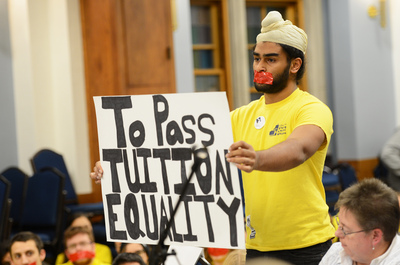FILE - In this Jan. 28, 2008 file photo, students walk on the University of Michigan campus in Ann Arbor, Mich. The University of Michigan decided Thursday, July 18, 2013, to allow students living in the country without authorization to pay in-state tuition, a victory for immigration reform activists who said that the University of Michigan, one of the nation's most prestigious higher education institutions, is out of reach for high school graduates living in the state without a residence permit. (AP Photo/Tony Ding, File)(Credit: AP)
BY DAVID EGGERT
ANN ARBOR, Mich. (AP) — The University of Michigan on Thursday decided to let immigrants living in the country illegally pay lower, in-state tuition, a victory for activists who said one of the nation’s most prestigious schools is financially out of a reach for high school graduates living in the state without legal permission.
The move applies to the flagship Ann Arbor campus and satellites in Flint and Dearborn and joins Michigan with other top public colleges like the University of Texas and the University of California, where students qualify for in-state tuition if they went to state high schools regardless of citizenship status. The Board of Regents voted 6-2 along party lines to make the change after university students waged a year-plus campaign for “tuition equality” that featured silent protests and other public demonstrations.
Democrats supported the plan, while Republicans voted against it. The proposal also allows members of the military to receive in-state tuition, regardless of where they live.
“These students want nothing more than what my family wanted and what every other student wants, which is to launch their lives from this university. These are students who have in most instances spent virtually all of their lives in Michigan,” said regent Mark Bernstein.
With a national immigration overhaul elusive, a small but growing number of states — 16 — have allowed in-state tuition rates for the immigrants since 2001, including 14 that passed laws explicitly authorizing the moves, according to the National Conference of State Legislatures. Two OK’d it through governing board decisions.
Three states bar the students from qualifying for in-state tuition, and two others prohibit them from enrolling altogether in public universities.
Though Michigan hasn’t enacted legislation either allowing or prohibiting in-state tuition rates for people here illegally, a few of its smaller 15 public universities have been able to allow them to pay in-state tuition. That’s because they’re independent under the state’s constitution. Advocates are hoping a high-profile step by Michigan’s most prominent school — and one of the top public universities in the U.S. — will set the stage for others to follow.
“It’s going to put the University of Michigan on the map for a college that really puts into action what we say we believe,” said Laura Sanders, a faculty member.


